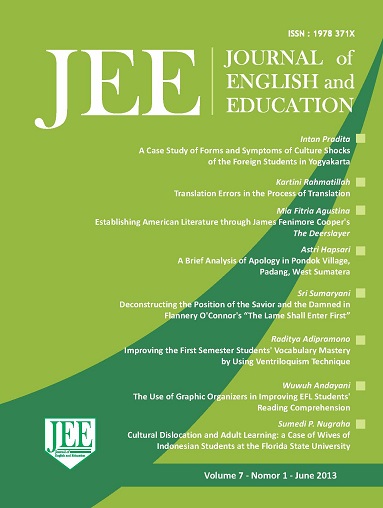Main Article Content
Abstract
Communication by using spoken language cannot be separated from human's daily life. Every day, a person uses various utterances or illocutionary acts- part of speech acts, in order to communicate what he/she has in his/her thought to others. One may use the speech act to give a compliment, make a request, refuse an invitation, ask for an apology, etc. The knowledge required by an addresser (speaker) to perform illocutionary acts constitutes part of his/her communicative competence. An appropriate illocutionary act will be delivered if the addresser has a good communicative competence of his/ her language. Thus, in discourse studies of a language, it is important to set up units of analysis called speech act sets (Olshtain and Cohen, 1983). In this paper, the speech act set that will be discussed is the speech act set for apology. The community involved in this research is Chinese generation in Pondok Village, Padang, West Sumatera. The research is done in situ – the actual place where one can see people realistically in the language being studied. The aims of the research are to describe and analyze speech act set for apology as demonstrated by Chinese generation in Pondok Village, Padang, West Sumatera.
Keywords: speech act set, apology, Chinese generation, Pondok Village, Padang, West SumateraArticle Details
Copyright (c) 2016 JEE, Journal of English and Education

This work is licensed under a Creative Commons Attribution-ShareAlike 4.0 International License.
Authors who publish with this journal agree to the following terms:
- Authors retain copyright and grant the journal right of first publication with the work simultaneously licensed under a Creative Commons Attribution-ShareAlike 4.0 International License that allows others to share the work with an acknowledgment of the work's authorship and initial publication in this journal.
- Authors are able to enter into separate, additional contractual arrangements for the non-exclusive distribution of the journal's published version of the work (e.g., post it to an institutional repository or publish it in a book), with an acknowledgment of its initial publication in this journal.
- Authors are permitted and encouraged to post their work online (e.g., in institutional repositories or on their website) prior to and during the submission process, as it can lead to productive exchanges, as well as earlier and greater citation of published work (See The Effect of Open Access).

